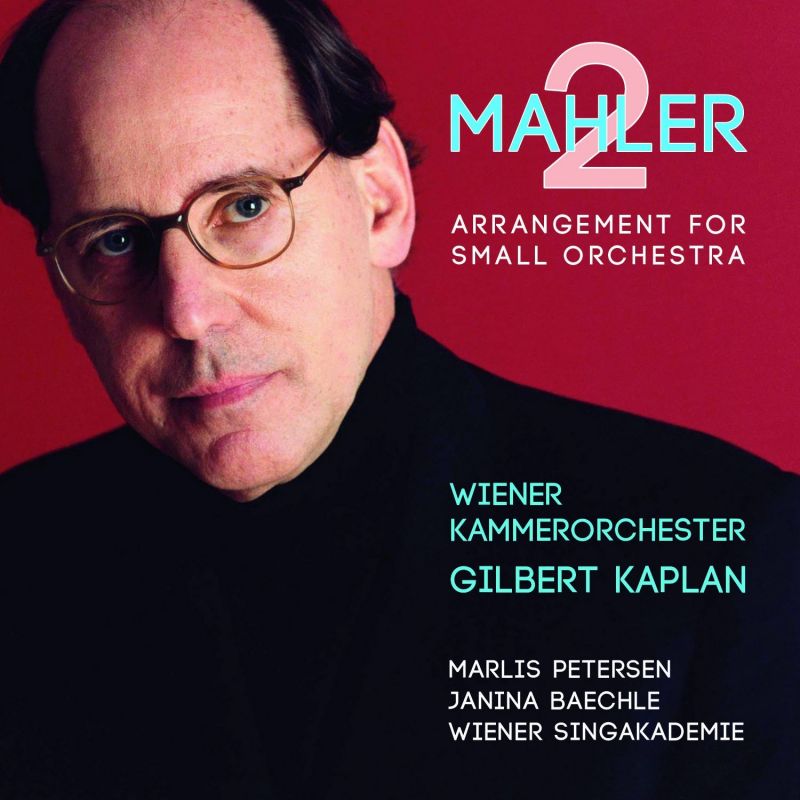MAHLER Symphony No 2
View record and artist detailsRecord and Artist Details
Composer or Director: Gustav Mahler
Genre:
Orchestral
Label: Avie
Magazine Review Date: 04/2014
Media Format: CD or Download
Media Runtime: 86
Mastering:
DDD
Catalogue Number: AV2290

Tracks:
| Composition | Artist Credit |
|---|---|
| Symphony No. 2, 'Resurrection' |
Gustav Mahler, Composer
Gilbert Kaplan, Conductor Gustav Mahler, Composer Janina Baechle, Mezzo soprano Marlis Petersen, Soprano Vienna Chamber Orchestra Vienna Singakademie Chorus |
Author: David Gutman
Universal Edition’s publication of the latest revamp gives him the opportunity to mount the podium once again and record the piece for the third time. There is little consensus about the viability of his endeavours in this area, not least because Kaplan is a wealthy amateur whose piano lessons went no further than yours or mine. A master of marketing, his earliest set (Pickwick, 1/89 – nla), featuring sundry Welsh choirs and a gung-ho LSO, is said to have shifted more copies than any other Mahler recording. Kathleen Ferrier aficionados might not be alone in querying those statistics. I don’t suppose Kaplan pretends to be a great Mahler conductor as opposed to an uber-faithful servant of what is, after all, the only complete composition he has ever directed in public, but he plainly relies on the willing co operation of colleagues to an extent which makes for less than incendiary results.
So it proves here. The hollowed-out score is rendered that much paler and dimmer than it needed to be. I cannot say whether the dearth of potentially destabilising passion and attack, like the preference for sluggish tempi, is a sensible precaution on the part of an amateur maestro or genuine interpretative preference (born of substantial albeit narrow experience). Entries are not always absolutely unanimous even so. Still, the timbre of mezzo Janina Baechle is well suited to the ‘Urlicht’ – and she at least appears to be at ease with the experience. The venerable choir, presumably trained by someone else, is also on form and the recorded sound is luminous and spacious in the ensemble’s regular home, Vienna’s Konzerthaus. Producer Rainer Maillard (who worked on Boulez’s as well as Kaplan’s DG recording of the Resurrection) is the ultimate pro.
If the Kaplan/Mathes arrangement really does help less prestigious amateur ensembles mount local performances, the endeavour might have a point and the recording serve as a useful template. As for repeated listening in the home, I can’t see it having much traction given the absence of old-school interpretative flair, let alone the heavyweight orchestral sonority Mahler demands. Even Kaplan fans may find that sensational final climax a disappointment. It’s a long time coming. Worse, the music conspicuously fails to build towards it. His LSO version, flawed as it is, conveys much more excitement at the close and is capped by real church bells…if you can find it. Then again, we’re still a very long way from Claudio Abbado in Lucerne, whose ‘celebration of the purest joy’ is available in multiple formats.
Discover the world's largest classical music catalogue with Presto Music.

Gramophone Digital Club
- Digital Edition
- Digital Archive
- Reviews Database
- Full website access
From £8.75 / month
Subscribe
Gramophone Full Club
- Print Edition
- Digital Edition
- Digital Archive
- Reviews Database
- Full website access
From £11.00 / month
Subscribe
If you are a library, university or other organisation that would be interested in an institutional subscription to Gramophone please click here for further information.




